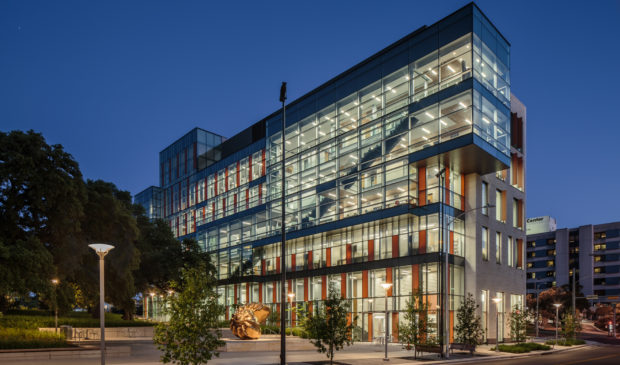Dell Medical investment begins to pay dividends
Monday, July 30, 2018 by
Ryan Young Dell Medical, the University of Texas’ new medical school, wants Travis County residents to know it is spending their tax dollars wisely – and equitably.
In 2012, voters approved $54 million of new property taxes to build Dell Med in conjunction with $85 million of matching local and federal funds. Construction of the school’s facilities on Red River is still ongoing, but that has not stopped it from teaching students or providing health care to the Austin area. Dell Med welcomed its first class in the summer of 2016, and the school has already begun opening clinics and seeing patients.
On Tuesday, Dr. Maninder “Mini” Kahlon and Dr. Michael Pignone made a presentation to the Travis County Commissioners Court detailing some of Dell Med’s first health care efforts.
“When we think about our impact in our community, the first way we create impact is through clinics and operations,” Kahlon said. She said Dell Med opened its first clinic in mid-October, and through April, the school has seen 2,700 patients, a “large majority” of which were on public health care programs such as Medicare, Medicaid and Central Health’s Medical Access Program.
“This shows you immediately that we’re beginning to see folks. And most of these areas are sub-specialty areas that didn’t have this kind of care focus before – these are new areas for our community,” Kahlon said.
Kahlon said Dell Med is also partnering with local health care providers, such as Seton Medical and the People’s Community Clinic, contributing its expertise, teaching focus and financial resources. For example, Amy Young of Dell Med’s Department of Women’s Health worked with local hospitals to examine the use of opioids and cut back their usage where it wasn’t necessary. They were able to reduce opioid usage by 40 percent.
“We’ve also been talking to the community … and we have come to understand a few priorities from the community that won’t surprise you,” Kahlon said. In order, they were mental and behavioral health, youth and workforce development, and the mandate to keep Dell Med a “responsible organization for the community.”
And being a responsible medical school means providing equitable health care, which is illustrated by Dr. Pignone’s work treating colorectal cancer in Travis County.
“Compared to national norms, those cancers are diagnosed at a little bit later stage here than we would like to have them be,” Pignone said. “Part of that reason is because of our high rate of uninsuredness and the number of people who do not have easy access to cancer screening.” Pignone said Travis County’s screening rate for colorectal cancer is 25 percent, while the national average for adults between 50 and 75 years old is about 63 percent.
Pignone wants to close that gap within three years. So, Dell Med worked with the Cancer Prevention Institute of Texas to obtain a $2.3 million federal grant to introduce a new low-cost screening option – the fecal immunochemical test (FIT), which allows patients to sample their stools at home and mail them in instead of taking time off to get tested at a clinic.
All of this fits in with Dell Med’s mission to train future physicians. “We’re also including our residents and medical students in the projects that they have … that build their education, help them understand the community’s issues,” Pignone said. “And most importantly, improve the health of our residents.”
The commissioners seemed impressed by Dell Med’s work.
“The area that I represent is often impacted in a disparate way, so I’m certainly interested in being helpful wherever I can. … I want to be involved in trying to help build the resources that are necessary to address issues,” said Commissioner Jeff Travillion.
“From 2016, about 1,400 Medical Access Program patients, which were the very low-income folks, were on a waiting list of up to a year to see a specialist, and you’ve eliminated the waiting list in roughly seven months. That’s fabulous. In the past we were hearing from people who were on those waiting lists who were in agony and were having to wait what seemed like an eternity to be seen,” Commissioner Brigid Shea said.
“I really appreciate your work with us in the jail, on women’s health, and on many other (areas),” County Judge Sarah Eckhardt said. “It’s very, very helpful to us, and I hope it’s helpful to you all in designing that care delivery system that really has the least among us in mind – those that are most in need of these resources.”
“We want to design the programs for those that have the least access to appropriate health care. Once we’ve done that, then it’s easier to open it up to people that have more resources,” Kahlon said. “Going the other way is dangerous. Because if you design the program for people that have a lot of resources, then try to make it work for those that don’t, that doesn’t work as well.”
Pignone said Dell Med’s clinic, UT Health Austin, will begin providing primary care around mid-August.
“If you have friends or family that don’t have doctors or are looking for doctors, we’re happy to take new patients,” he said.
Correction: The photo accompanying an earlier version of this article was of Seton’s hospital. Photo of Dell Medical School courtesy of Dell Medical School.
The Austin Monitor’s work is made possible by donations from the community. Though our reporting covers donors from time to time, we are careful to keep business and editorial efforts separate while maintaining transparency. A complete list of donors is available here, and our code of ethics is explained here.
You're a community leader
And we’re honored you look to us for serious, in-depth news. You know a strong community needs local and dedicated watchdog reporting. We’re here for you and that won’t change. Now will you take the powerful next step and support our nonprofit news organization?









